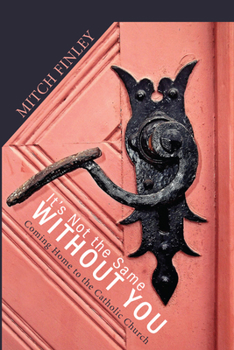It's Not the Same Without You
Select Format
Select Condition 
Book Overview
In a heartfelt invitation to lapsed or estranged Catholics, Mitch Finley takes a realistic look at the reasons people feel alienated, and proposes ways to overcome the anger, bitterness, and resentment so that they may return. Sixty million people in the United States claim a Catholic identity. The next largest group--approximately nine million--is made up of people who are ""fallen away"" Catholics. Mitch Finley addresses this audience, as well as parents struggling with the almost inevitable teenage rebellion against religion. Finley examines a wide variety of reasons Catholics choose to leave the Church, treating each one in a fair-minded way. He recounts dozens of true stories about people who left and returned, a few about those who have yet to return, and candidly acknowledges that many--perhaps most--active Catholics experience periods of estrangement. Asking forgiveness on behalf of the Church for the ways lapsed Catholics may have been hurt by the institution or its official representatives, he also reminds readers that forgiveness needs to go both ways. Encouraging Catholics to begin a new relationship with their religion, Finley suggests ways to become part of a parish once more. He also discusses the Church's obligations to those who have left, highlighting successful outreach programs. In guiding readers along the path from alienation to reconciliation, Finley shows that there are good reasons for ""coming home again,""
Format:Paperback
Language:English
ISBN:1625645686
ISBN13:9781625645685
Release Date:January 2014
Publisher:Wipf & Stock Publishers
Length:194 Pages
Weight:0.55 lbs.
Dimensions:0.5" x 5.5" x 8.4"
Customer Reviews
1 rating
A Practical Guide for Returning Catholics
Published by Thriftbooks.com User , 22 years ago
IT'S NOT THE SAME WITHOUT YOU: COMING HOME TO THE CATHOLIC CHURCH by Mitch Finley is an interesting book dealing with lapsed Catholics and (from their perspective) how they find their way back to the Church and (from the perspective of ministry) how they can be encouraged to return. The author, who has penned a number of short books, asserts that not only must the Church work to welcome home those who have been alienated by abuse, misinterpretation, confusion, hypocrisy, and indifference, but that those people owe it to themselves to take the concrete steps to reconcile themselves with the faith of their childhood. A good portion of the book consists of anecdotes of both successful returnees, works in process and failed attempts as Mr. Finley explains the many reasons for initial alienation as well as opportunities for evangelization.The central theme is one of reconciliation on both parts, and of the need for deep and genuine listening to the concerns and hurts (both real and imagined) of those who have become estranged. Many have turned away from the church, some for valid reasons. He encourages who have left because of the human failings of its clergy and members, to recognize that the church is much larger than its members; it is faith. He also presents several models of successful outreach employed by a number of parishes throughout the country. Returning Catholics are given specifics on how to once again become part of the life of the Church in all aspects: faith, social, community, morality. The author offers a gentle approach, offering a model for reconciliation rather than condemnation.The book is generally well written; there are a few grammatical errors and some inconsistent statistics. However they detract only slightly from what is a good presentation of reconciliation and return.






